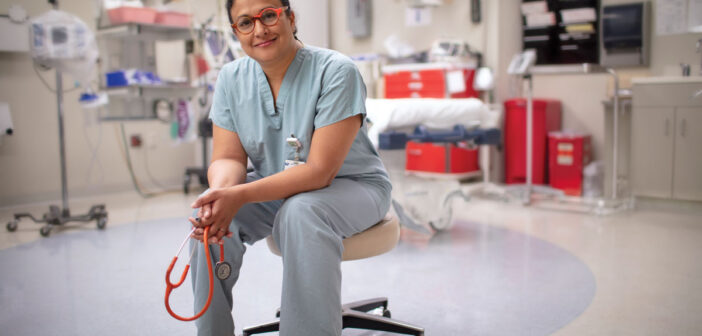A toxicologist is mobilizing addiction treatment in Worcester.
Kavita Babu ’96 MD’00 RES’04 never thought she’d be an emergency physician. But following that career path, she says, has turned out to be “awesome.”
Babu is chief of the Division of Medical Toxicology at the University of Massachusetts Medical School and the director of Road to Care Mobile Addiction Service. The program, funded by the Massachusetts Department of Public Health, provides clinical care and medications for addiction treatment in a handful of shelters, food pantries, and homeless encampments in Worcester.
The program launched in May 2021 to provide education and a lifeline to residents at high risk for overdose and other medical complications associated with substance use disorders. The CDC estimates there were 105,752 drug overdose deaths in the US in the yearlong period that ended last October—15.9 percent more than the previous 12 months. “We are still setting records due to overdose deaths,” Babu says.
Babu completed a fellowship in medical toxicology at UMass in 2006 and was working on issues related to prescription opioids when she and her peers witnessed a shift around 2013 and 2014. “Fentanyl created a storm of overdoses in young adults,” she says. “These folks would be found at home and brought to the emergency department. Then we were breaking the news to partners and siblings.”
She dreaded informing families of a fatal overdose. But those encounters launched her into the overdose prevention work that has defined much of her career. In 2018, she was tapped to head UMass Memorial Health’s overdose prevention efforts. Then the Worcester commissioner of Health and Human Services approached Babu about a mobile service, and that started the Road to Care rolling.
The program’s team consists of five physicians, one physician associate, and a behavioral health coach. They address urgent primary care, mental health, and addiction medicine needs ranging from COVID-19 vaccines to prescriptions for treatments like Suboxone to naloxone distribution.
Those duties require Babu to call upon all the lessons she learned from multiple mentors at Brown. “My models from the earliest days were the guys from M*A*S*H,” Babu says. “I wanted to grow up and be a general surgeon. I signed up for an emergency medicine rotation to prepare me for the surgical sub-internships so I could be better suited for the surgical work I had downstream.”
Instead, she found her people. “They were decisive, whip-smart, funny, humble, and motivated to improve public health,” Babu says. She credits Marc Shapiro, MD, then the emergency medicine clerkship director, as the person most responsible for her entering the specialty; Angela Anderson, MD, associate professor of pediatrics and of emergency medicine, was one of her first mentors in medical toxicology. “The two of them were incredibly influential,” Babu says.
For now, the Road to Care is stationary, with team members meeting about 800 patients at brick-and-mortar facilities. They’ll expand their services once an RV retrofitted as a mobile clinic is ready for use (production was delayed by the pandemic). “The value of having a vehicle as a home base is we will be able to address more people in more locales,” Babu says. “There is a need for expansion in North Central Massachusetts, where we have several hard-hit towns.”
Community organization efforts and Road to Care resources in Worcester have helped alleviate treatment gaps. But services are needed in a wide area. “We are going to grow,” Babu says. “All of the visits now are walk-in, free care. We are spending a lot of time at these. We are not going to leave that behind. Hopefully, we will have a mobile unit by the summer.”




